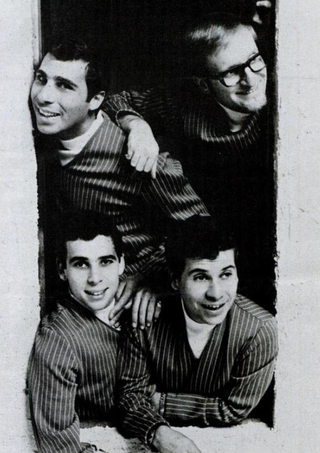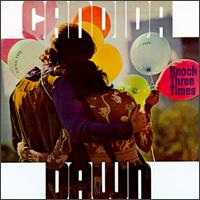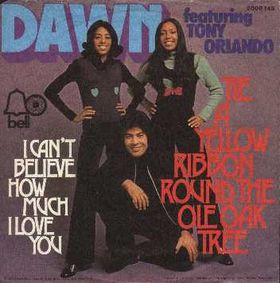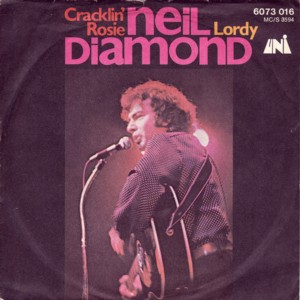
"Candida" was the first single released by the American pop music group Dawn, with vocals by Tony Orlando, in July 1970. The song, written by Irwin Levine and Toni Wine, was produced by Dave Appell and Hank Medress for Bell Records. Appell and Medress originally recorded another singer on the track, but decided that a different vocal approach would be preferable. Medress then approached Orlando to do the vocals. Orlando had been a professional singer in the early 1960s, but now worked as a music publishing manager for Columbia Records. Although initially worried about losing his job at Columbia, Orlando eventually agreed to lend his voice to the track.

Tony Orlando and Dawn is an American pop music group that was popular in the 1970s, composed of singer Tony Orlando and the backing vocal group Dawn. Their signature hits include "Candida", "Knock Three Times", "Tie a Yellow Ribbon Round the Ole Oak Tree", "Say, Has Anybody Seen My Sweet Gypsy Rose", and "He Don't Love You ".

Michael Anthony Orlando Cassavitis is an American pop singer whose career spans over 60 years. He is best known for his work as part of Tony Orlando and Dawn.
David Appell was an American musician, musical arranger and record producer born in Philadelphia.

Henry "Hank" Medress was an American singer and record producer, best known for his taking part in the American band The Tokens.

The Tokens were an American doo-wop band and record production company group from Brooklyn, New York City. The group has had four top 40 hits on the Billboard Hot 100, all in the 1960s, their biggest being the chart-topping 1961 hit single "The Lion Sleeps Tonight". "The Lion Sleeps Tonight" borrowed heavily from the 1939 song "Mbube" by South African singer Solomon Linda. They are also known for having Neil Sedaka as an original member, before he pursued a solo career.

"You're All I Need to Get By" is a song recorded by the American R&B/soul duo Marvin Gaye and Tammi Terrell and released on Motown Records' Tamla label in 1968. It was the basis for the 1995 single "I'll Be There for You/You're All I Need to Get By" from Method Man and Mary J. Blige.

Toni Wine is an American pop music songwriter, who wrote songs for such artists as The Mindbenders, Tony Orlando and Dawn ("Candida"), and Checkmates, Ltd. in the late 1960s and 1970s. Wine also sang the female vocals for the cartoon music group The Archies, most notably on their #1 hit song "Sugar, Sugar". She shared the lead vocals in the Archies' subsequent single, "Jingle Jangle" with Ron Dante using his falsetto voice. In addition, Wine was a backing vocalist on "It Hurts to Be in Love" and on Willie Nelson's "Always on My Mind."

"Could It Be Magic" is a song written by Adrienne Anderson and composed by Barry Manilow, inspired by Frédéric Chopin's Prelude in C minor, Opus 28, Number 20.

Candida is a 1970 album by Dawn, a studio session group including Tony Orlando, Toni Wine, and Linda November. Orlando was singing under the group name "Dawn" in order to avoid problems with his contract with his other label, CBS. However, after the success of the album tracks "Candida" and "Knock Three Times", he invited two other singers to become the real-life "Dawn", and then "Tony Orlando and Dawn" could tour in support of the songs.

"Something He Can Feel" is a song composed by Curtis Mayfield for the 1976 motion picture Sparkle. The song, a love ballad in a Chicago-/Philly-soul style, became a number-one hit on the Billboard's R&B singles chart in the United States twice with two separate recordings: a 1976 version by Aretha Franklin from the film's soundtrack, and a 1992 cover by girl group En Vogue.

"Tie a Yellow Ribbon Round the Ole Oak Tree" is a song recorded by Tony Orlando and Dawn. It was written by Irwin Levine and L. Russell Brown and produced by Hank Medress and Dave Appell, with Motown/Stax backing vocalist Telma Hopkins, Joyce Vincent Wilson and her sister Pamela Vincent on backing vocals. It was a worldwide hit for the group in 1973.

Joyce Vincent Wilson is an American singer, best known as part of the group Tony Orlando and Dawn.

"Cracklin' Rosie" is a song written and recorded by Neil Diamond in 1970, with instrumental backing by Los Angeles session musicians from the Wrecking Crew, including Hal Blaine on drums, Larry Knechtel on keyboards, Joe Osborn on bass, Al Casey on guitar and Gene Estes on percussion – arranged by Don Randi. The song was included on Diamond's album Tap Root Manuscript. In October 1970 the song became Diamond's first American No. 1 hit within the Billboard Hot 100, and his third to sell a million copies. It was his breakthrough single on the UK Singles Chart, reaching No. 3 for four weeks in November and December. Billboard ranked the record as the No. 17 song of 1970. It also reached No. 2 in both the Australian Singles Chart and the Irish Singles Chart. Its best performance was in New Zealand, where it stayed at No. 1 for five weeks at the end of the year.

"C'mon Marianne" is a song composed by L. Russell Brown and Raymond Bloodworth and popularized by The Four Seasons in 1967. Produced by Bob Crewe, the single was the last Four Seasons single to reach the Top Ten of the Billboard Hot 100 chart in the 1960s, and their last Top Ten hit until "Who Loves You" in 1975.

“Say, Has Anybody Seen My Sweet Gypsy Rose” is a 1973 song by the American pop music group Tony Orlando and Dawn. Written by Irwin Levine (lyrics) and L. Russell Brown (music), it was included on the group's 1973 album, Dawn's New Ragtime Follies.

Love Story is the twenty-seventh studio album by American pop singer Andy Williams that was released on February 3, 1971, by Columbia Records. This was another in his series of cover albums, but the title track, subtitled "Where Do I Begin", was the one song included that he originated.
Irwin Jesse Levine was an American songwriter, who co-wrote the song "Tie a Yellow Ribbon Round the Ole Oak Tree" with L. Russell Brown. The song was a worldwide hit for Tony Orlando and Dawn as it reached number one on both the US and UK charts for four weeks in April 1973 and number one on the Australian charts for seven weeks from May to July 1973. It was the top-selling single in 1973 in both the US and UK. In 2008, Billboard ranked the song as the 37th biggest song of all time in its issue celebrating the 50th anniversary of the Hot 100.

Tuneweaving is the third album by American popular music group Dawn released in 1973 by Bell Records. The title track reached number one in both the US and UK. In terms of sales, this single was the most successful in the group's career, starting a string of seven consecutive Hot 100 appearances. Another track, "You're a Lady" by English singer/songwriter Peter Skellern, reached number 70 on the US charts. The group changed their name to "Tony Orlando and Dawn" later in 1973.
Tony Orlando and Dawn is a television variety show that aired from 1974 to 1976 on CBS. The show featured the American pop music group Tony Orlando and Dawn. The show was titled The Tony Orlando and Dawn Rainbow Hour during the 1976–1977 television season.

















